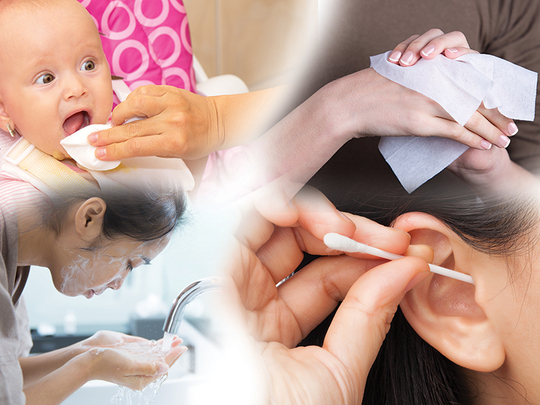
Dubai
You wash your face every morning with a cleanser that has microbeads, which clear your pores. You might even use a cotton bud to clean ear wax. And finally, you pick up your child for a diaper change, armed with the handy wet wipe. But, what you may not realise is that many of these products that we use on a daily basis to stay clean are harming the environment and us, too.
Let’s first look at the wet wipes. These moistened towelettes are extremely helpful and even save us the trouble of having to use a traditional cloth, which would have to be washed later.
Nahla Belkhodja, a Dubai-based French national, who has a two-year-old son and so uses baby wipes on a daily basis.
She said: “I use a maximum of four wipes in a day. When my son was younger, I wouldn’t use the wipes. Instead, I was cleaning with water. In a month, I spend Dh40 on this product on average.”
Most of these disposable wipes contain plastic fibres that are not biodegradable, as stated in a report published on TreeHugger, a US-based media outlet dedicated to driving sustainability.
The report states: “When the wipes make their way into the ocean, they get ingested by sea creatures, such as turtles, who mistake them for jellyfish and eventually die.”
Belkhodja said: “I am aware of the effects these wipes have on the environment and so, I am trying to use them as less as possible. However, when we go out, I prefer to use them as they are convenient.”
In the UK, wet wipes have become the fastest growing cause of pollution on beaches, as stated by the Marine Conservation Society. Additionally, a study published by Water UK, the trade body representing all of the main water and sewerage companies in the country, found that “wipes made up about 93 per cent of the material causing the sewer blockages” in the UK.
Another product of concern is facial cleansers and hand soaps with microbeads. These beads are used as an exfoliant. But, according to a report published by Environment and Climate Change Canada, when used in personal care products, microbeads can enter the environment through wastewater treatment plants. The plastic balls are too small to be filtered out by sewage systems before they reach rivers and seas.
Microbeads with low densities will float and be eaten by marine life. They can cause serious harm to marine animals and leach out toxic chemicals.
Neola Castelino, an Indian pupil based in Dubai, has been recycling plastic products for a few years now. As someone who is a strong advocate for recycling, she has made a conscious decision to avoid using any such products that contain microbeads.
She said: “I personally do not use such cleansers. Instead, I use natural, homemade products, that consist of aloe vera or neem. There are many home remedies to clean your pores.”
According to the Greenpeace, a global nonprofit organisation, all personal care and cosmetic products containing microbeads will be off the shelves in the UK by June 30, 2018. This came after 350,000 people signed a petition calling for a ban on microbeads.
Castelino is of the opinion that there should a worldwide ban on such products, because plastic is already causing a lot of damage to the environment.
She said: “It was a great initiative by the Greenpeace, because these mircobeads are harmful! Many people don’t even realise its effects on the planet. But, with their campaign, many know about it and so other governments should consider a similar ban. The issue doesn’t just end at environmental impact. When we consume the marine animals, we end up consuming the beads, too.”
However, these cleansers consisting of microbeads are not the only problem. Other hygience products are also ruining the environment. One such culprit is the cotton bud used to clean ear wax.
According to the UK-based Marine Conservation Society, these buds are composed largely of the plastic polypropylene, thus making it part of the wider plastic pollution problem. They are supposed to be thrown in the bin, but many people flush them down, which means they can wind up on beaches through the sewer system.
I. S. Adithiyanrajan, a student based in Dubai, has always had strong views about preserving energy and protecting the environment. In fact, he has written several community reports to Gulf News on the issue and lack of recycling. In his opinion, awareness needs to be raised about how a simple product as a cotton bud can be harmful for the environment.
He said: “It is necessary that we have to stop these effects as soon as possible. We have to focus on individual awareness so that the impact on the environment is lesser than the dangerous levels. I rarely use this product. I’m sure we can take care of our ears. Instead of using these buds, we need to find an alternative solution.”
Many international campaigns exist online, asking for a ban on such products in order to cut pollution. In response to these campaigns, multinational corporation Johnson & Johnson decided last year that they would stop selling these buds in many countries. The company will instead use paper to make the stick of the buds.
Adithiyanrajan said: “Such inventions are needed, which are innovative and useful. Other global companies should also compete and find better environmentally friendly solutions.”
While we may think we’re being hygienic, we fail to understand the impact of our actions on the planet. It seems like good old water would be a much better alternative for many of our cleansing scenarios.








